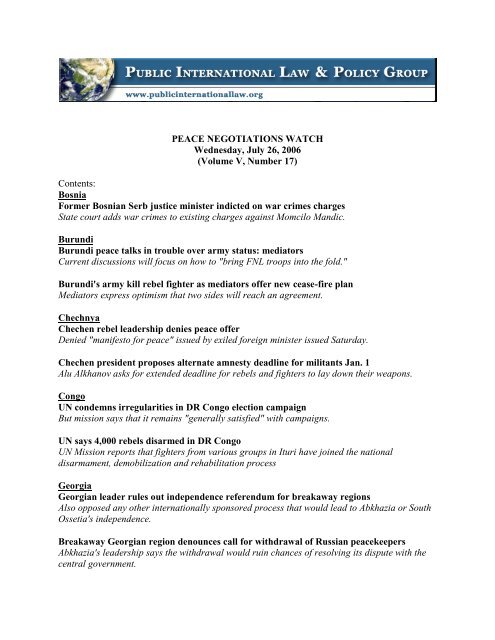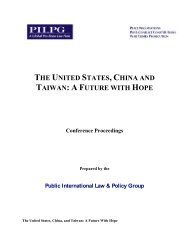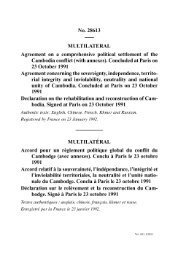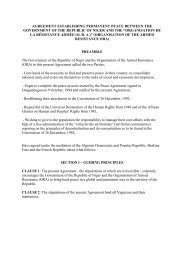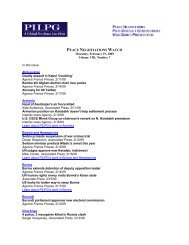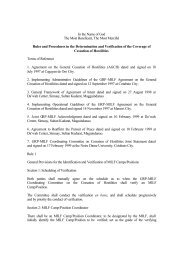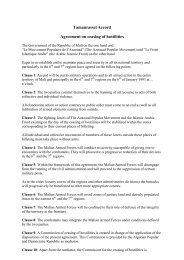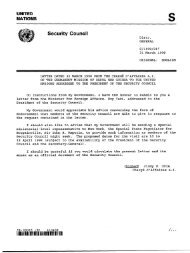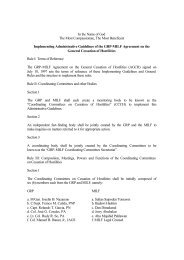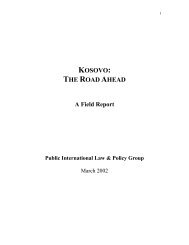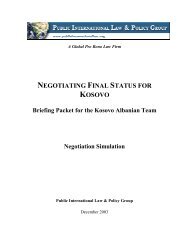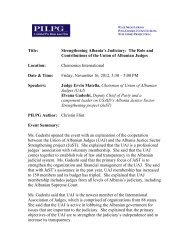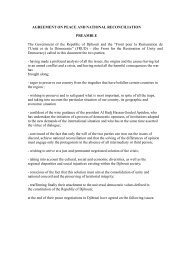Peace Negotiations Watch- Volume V, Number 17, July 26, 2006
Peace Negotiations Watch- Volume V, Number 17, July 26, 2006
Peace Negotiations Watch- Volume V, Number 17, July 26, 2006
- No tags were found...
You also want an ePaper? Increase the reach of your titles
YUMPU automatically turns print PDFs into web optimized ePapers that Google loves.
Breakaway region's fate in limbo as Tbilisi and Moscow tussle for controlSouth Ossetia's rebel president claims that Georgia is preparing for war.IndonesiaIn Aceh, a year of peace but ex-rebels fear for futureWorries about employment plague ex-rebels in the region.Ivory CoastUN official: Ivory Coast's ruling party is stalling peace processTop election supervisor claims Gbagbo's party is increasing the "feeling of insecurity andinstability" by encouraging demonstrations and delaying national ID program.Ivory Coast's largest city faces blockade by pro-government militantsProtestors blocked major routes in opposition to the proposed identification program.KashmirTop Kashmir separatist urges India, Pakistan to continue talksFarooq urges leaders to not allow events like the Mumbai bombings to derail talks.KosovoSerbian, Kosovo leaders to take part in Vienna talksMeeting will be the first since 1999 NATO bombing campaign.Kosovo independence could lead to secession of Serb-populated northSerbian government representative claims northern Kosovo will "never be part of anindependent Kosovo."LiberiaFormer Liberian President Charles Taylor appears in court for pretrial hearingTaylor complains about food and access to telephones at first appearance at The Hague.NepalNepal Maoists pledge ceasefire extension, seek "lasting peace"Rebel leadership scheduled to meet Prime Minister last Friday for a second round of talks.EU urges Nepal's Maoists to disarm before electionsDuring a trip to the country, 7-member EU delegation met with leaders of rebels andmainstream political parties.U.N. to send high-level team to Nepal to assist peace processHeaded by Staffan De Mistura, the team arrives in Nepal on Wednesday for negotiations on U.N.assistance for the peace process.
ChechnyaChechen rebel leadership denies peace offerAgence France Presse, 7/19/06The Chechen separatist leadership denied Wednesday that rebels were ready to drop theirdemand for independence in exchange for peace in Chechnya, according to a statement on rebelwebsites. The "presidential administration" of the rebel government denounced a statement titled"manifesto for peace" that Akhmed Zakayev, the exiled foreign minister in the fugitiveleadership, issued Saturday. "Any acts putting into doubt the state sovereignty (of Chechnya), orany attempts to discuss the sovereignty are state crimes," the administration of rebel presidentDoku Umarov said on two rebel websites: www.chechenpress.info and www.kavkazcenter.com."The leadership does not intend to offer peace or talks with the aggressor until there are realconditions for this."Zakayev, who represents the more moderate wing of the 15-year-old Chechen independencedrive and lives in exile in London, wrote in his manifesto that the rebels were "ready for thenecessary negotiations" on peace and that independence was no longer a pre-condition. Umarovbecame the rebels' president after the killing by Russian forces of his predecessor Abdul-KhalimSaidullayev on June <strong>17</strong>. Umarov is thought to be in hiding in or near Chechnya, where guerrillasmaintain low-level resistance against a huge Russian military presence.Chechen president proposes alternate amnesty deadline for militants Jan. 1Associated Press, 7/19/06Chechnya's Moscow-backed president called for separatist rebels and fighters in neighboringNorth Caucasus regions to be given until Jan. 1 to lay down their arms and take advantage of aproposed amnesty, a Russian news agency reported Wednesday.Alu Alkhanov's appeal came a day after Russia's security chief said authorities were planning tooffer amnesty to militants who give up their fight by Aug. 1 a bid to decrease rebel resistancefollowing the death last week of Chechen warlord Shamil Basayev.The Interfax news agency quoted Alkhanov as saying that extending the deadline until Januarywould give militants "time to contemplate their decision and make use of a chance to becomefree and return to peaceful pursuits for the well-being of their Motherland." Chechen strongmanRamzan Kadyrov, the regional prime minister who is likely to succeed Alkhanov as president,called Tuesday for setting a Sept. 1 deadline.Russian President Vladimir Putin has refused to negotiate with Chechen rebels during more thansix years in office, but authorities have lured militants into the fold with pervious amnesties andpromises of leniency. Many in the security forces of Chechnya's Kremlin-backed government areformer rebels. Basayev, the Chechen warlord behind Russia's deadliest terror attacks and battleswith police and military forces, was killed by an explosion last week in what Russian authoritiessaid was a well-planned operation. Separatist representatives said his death was an accident.
CongoUN condemns irregularities in DR Congo election campaignAgence France Presse, 7/19/06The UN mission in the Democratic Republic of Congo (MONUC) Wednesday condemned"inappropriate acts" in the campaign leading to elections at the end of this month. Lamentingclashes between rival supporters and attempts to bribe voters, MONUC said however that it"remains generally satisfied" with the campaign for legislative and presidential elections to beheld on <strong>July</strong> 30, now in its third week. But MONUC deputy spokesman Jean-Tobie Okalacondemned a number of incidents and irregularities nationwide at a news conference inKinshasa.These included clashes Saturday at a stadium in Kinshasa between backers of Oscar Kashala,one of 33 presidential candidates, and young stone-throwers who were beaten up, and thebanning of an opposition march in Goma in the east of the country. Cases of physical attacks anddestruction of posters and banners were reported in several places.At Kananga in western Kasai province, the Congo Liberation Movement (MLC) of VicePresident Jean-Pierre Bemba and the People's Party for Reconstruction and Democracy (PPRD),which backs sitting President Joseph Kabila, were accused of noting down the numbers on voteridentity cards. They then handed out T-shirts and showed the symbols of the party they wantedthose participating at rallies to vote for. In some cases, the numbers of voters' cards went into alottery which handed out prizes, UN observers said. In another region, arguments between PPRDand MLC backers turned into pitched battles.MONUC's human rights division condemned the "nitpicking" and "threats" from political partiesor government officials targetting human rights activists and journalists as the elections drewnearer.UN says 4,000 rebels disarmed in DR CongoAgence France Presse, 7/19/06Almost 4,000 militia fighters have laid down their arms in the Ituri region of northeasternDemocratic Republic of Congo (DRC) since June, the United Nations mission in the country saidon Wednesday. Fighters from various groups in the volatile province "joined the nationaldisarmament, demobilisation and rehabilitation process" as war-scarred DRC prepares formilestone elections, said Stephane Lescoffit, military spokesman for the mission (MONUC).As well as demobilising, the fighters surrendered 2,141 weapons between them, Lescoffit said.Despite the successful disarming of more than 15,000 militia fighters last year, thousandsopposed to the national disarmament drive remain active in Ituri, preventing some 200,000internally displaced people from returning home. DRC military authorities invited local militiasresisting disarmament to join them in talks.
Breakaway region's fate in limbo as Tbilisi and Moscow tussle for controlSimon Ostrovsky, Agence France Presse, 7/20/06To Radion Gazzayev, the latest rekindling in tensions between Georgia and Russian-backedrebels in South Ossetia has meant the death of his little brother and being forced to use a crutch.Two separate, unsolved explosions targeted separatist officials in the province last week, onekilling the local security council chief, the other two passersby -- Radion's brother Ibrahim andanother teenager.Georgia's parliament on Tuesday followed up the most recent flare-up in violence in thistroubled corner of the Caucasus with a resolution calling for Russian peacekeepers to be replacedby an international force in South Ossetia and in a second rebel Georgian province, Abkhazia.Georgia's pro-Western President Mikheil Saakashvili is expected to bring up the assembly'sdemands at talks with Russian President Vladimir Putin in Moscow this weekend. But Ossetianssay Georgia is stirring the violence, including the bomb which exploded in a tree in the center ofTskhinvali, South Ossetia's capital, as Radion and his brother were helping a neighbor loadsmoked fish onto a truck.Shrapnel downed 19-year-old Radion, hitting his arms and piercing a leg while the blast wavethrew Ibrahim into the air killing him a few moments later. "The Georgians did this because theywant Tskhinvali to be theirs," Radion said as he leaned on a crutch at his brother's funeral onMonday. Georgia denies it planted the bombs. The speaker of parliament, Nino Burjanadze,blamed Russian security services and warned of more such "provocation." "There will be seriouscomplications with Russia after the parliament's decision," Burjanadze told AFP, adding that sheexpected Russia to "heat up" the situation in Ossetia to create excuses for the peacekeepers tostay. Burjanadze said that though Ossetians are against the departure of Russian troops, a neutralinternational police force was needed to guarantee the safety of both ethnic-Ossetian andGeorgian living in the conflict zone.Georgia also wants the Russian contingent, which it says acts like an occupying power, to bereplaced by an international force, breaking the uneasy status quo that has held since Tbilisiended its disastrous war with the Ossetians in 1992. "We will not allow Russia to annex theterritories of Georgia and we will use all civilized methods to do this," Georgian ConflictResolution Minister Giorgi Khaindrava told AFP.There is hostility to this among the Ossetians, who say that the Russian presence is the onlyguarantee of continued autonomy from Tbilisi. "What kind of peacekeeping mission do theywant here? Afghan or Iraqi? We don't need any other force besides the Russians," the region'srebel president, Eduard Kokoity told AFP in a recent interview in his office.The latest parliamentary move came amid a backdrop of growing tensions between Russia andits tiny neighbor Georgia, with whom already poor relations further cooled when the USeducatedSaakashvili came to power in 2003. The Organization for Security and Cooperation inEurope, which mediates the conflict, said an escalation followed Russia's closure of the mainroad between Russian and Georgia recently, ostensibly for repairs.
Traffic between the two countries was diverted through the separatist region, which is dottedwith dozens of ethnic-Georgian and Ossetian villages, while both sides have been making"strong" verbal exchanges, an OSCE diplomat said. Combined with the recent bomb blasts andthe cancellation of scheduled talks, "this makes for a very tense situation," the diplomat saidwhile expressing hope that progress could be made at talks that have been rescheduled for amonth from now in Moscow.Saakashvili has vowed to bring both Ossetia and Abkhazia back into the Georgian fold. But thisgoal is complicated by the fact that most of the citizens of the breakaway regions have beengranted Russian citizenship.The Russian ruble is in circulation and the Russian flag is prominently on display throughoutboth Abkhazia and Ossetia.South Ossetia is also ethnically linked to the North Ossetia region in Russia, whose leaders havevowed to throw their weight behind Tskhinvali in the event of a new war with Georgia. "Georgiamust gather up the political will to recognize South Ossetia and Abkhazia. We are not theaggressors, we are the victims," Kokoity said. But Tbilisi sees the regions as conduits forcontraband and organized crime and as it boosts its military, with US support, it has undertakenthe construction of a new army base just outside of rebel-controlled territory.This has lead Tskhinvali as well as Moscow to accuse Georgia of preparing to take over theprovince. "Georgia is intensely readying for war," Kokoity said, "they have launched terroristattacks against our leadership," he said in reference to the recent bomb blasts. Georgia has deniedit is planning an attack, instead saying Russian media were stoking tensions in a smear campaigntimed to coincide with a Group of Eight leading nations meeting in Saint Petersburg last week.IndonesiaIn Aceh, a year of peace but ex-rebels fear for futureLambaro Neujid, Agence France Presse, 7/<strong>17</strong>/06Former separatist rebels in Indonesia's Aceh have enjoyed a year of peace but, as they slowly tryto build new lives for themselves, they are worried about the future. In the village of LambaroNeujid, nestled at the foot of stunning mountains outside the provincial capital Banda Aceh, exrebelSyahir has just been married, with comrades Bunaiga and Marzuki in attendance. A modesttent for the wedding guests has been erected in front of a semi-finished house built to replace onelost to the 2004 tsunami which lashed Aceh's shores, killing some 168,000 people here.Syahir and his new bride remain in the house, as tradition dictates, while the guests line up forlocal goat ragout with heart of banana tree. Just over a year ago, Bunaiga and Marzuki weremembers of the Free Aceh Movement (GAM), fighting for the province's independence fromJakarta as they hid in the mountains. While they have been welcomed back with open arms totheir home village, they have no jobs and few prospects.
Marzuki, 28, entered the separatist movement at an early age so he did not complete hisschooling and now lacks employable skills. "Many of us left school to join GAM, so it's difficultto get a job once you're back without qualifications," he tells AFP. Shaven-headed, chainsmokingBunaiga joined the rebels when he was only <strong>17</strong>. Six years later, he is making do withsmall jobs buying sand or stone needed for the many houses being built by foreign aid agencieshere. "But it's only for three or four days a month," he complains, lighting another cigarette.Bunaiga lost his entire family in the tsunami, so he relies strongly on his former comrades forhelp and work. "Although we have all left the mountains," he says, "we still have a strong senseof solidarity".As part of a peace pact GAM signed with the Indonesian government in August last year, some3,000 former fighters have left the mountains to settle back into their respective communities,according to the European Union-led Aceh Monitoring Mission (AMM). Another 2,000 politicalprisoners have been amnestied, the AMM says. The agreement ended a 29-year-old conflict thatkilled 15,000 people, mostly civilians.The peace process is not yet complete, with the Indonesian government only passing anautonomy law for the province last week. Ex-rebels are studying the law and have warned theymay complain to the AMM over some provisions. To help them start over, former GAMmembers have each been given economic assistance packages worth four million rupiah (about400 dollars). The government has also poured 600 billion rupiah for <strong>2006</strong> into the new AcehReintegration Body (BRA), which is dealing with the issues faced by ex-combatants and conflictvictims.But Marzuki is impatient. "It's been three months since I filed a proposal to start a carpentryworkshop, but I still haven't had any reply so far," he complains. According to BRA head YusniSaby, frustrations from ex-rebels stem from a misunderstanding of the body's mechanisms. "Wedon't deal with personal proposals anymore, except those coming from families of deceased,handicapped persons or people who lost their homes because of the conflict," he explains. "Therest are dealt with through community-based assessment. Every village will get a certain amountof funding from the 600 billion rupiah to review proposals directly."Lahmuddin, 30, used to command one of the regional GAM regiments around the southwesterntown of Blang Pidie. He also fought around this village, where he met his wife Marlina. He has asense of belonging to the place, a feeling perhaps strengthened by the giggly six-month-old sonhe holds in his arms. But still, he still misses some of the times since he entered GAM in 1994."Even though we had to hide, our mind was at peace. Now all we worry about is finding a joband money," he says. "It has turned into an obsession."
Ivory CoastUN official: Ivory Coast's ruling party is stalling peace processFranz Wild, Associated Press, 7/18/06The United Nation's top election supervisor in war-divided Ivory Coast accused PresidentLaurent Gbagbo's ruling party of stalling the peace process. Gerard Stoudman said Monday thatthe president's party is increasing the "feeling of insecurity and instability" by pushing youngloyalists toward violent demonstrations in the streets and slowing the move toward peace bydelaying a national identification program.Stoudman's comments came a day after Gbagbo accused the United Nations of being partial torebels who have occupied the north of Ivory Coast since the world's largest cocoa producer wassplit by a civil war in 2002. Stoudman criticized foot-dragging by the party on a program toprovide identity papers to millions of potential voters ahead of presidential elections set to occurby Oct. 31.Starting Monday, 50 mobile courts were scheduled to open across the country to provide birthcertificates to the estimated 3.5 million residents without identity papers. People who have atleast one Ivorian parent could also get a nationality certificate, necessary for the identity card thatwill allow them to vote. Gbagbo's party has demanded that the start of any such program beaccompanied by disarmament by the rebels and the mobile courts have only opened in someareas.Stoudman argued that the first stage of disarmament the move of rebel forces back to theirbarracks is underway. "There has been progress in regroupment, although it's not perfect. Noprocess is perfect," he said. Gbagbo loyalists have said that rebels are trying to manipulate theidentification program to commit an elaborate fraud, getting Ivorian nationality for millions offoreigners, who would then vote for Gbagbo's rivals in presidential elections scheduled forOctober 31.Ivory Coast's largest city faces blockade by pro-government militantsFranz Wild, Associated Press, 7/19/06Hard-line supporters of Ivory Coast President Laurent Gbagbo blocked major routes in thecountry's largest city Wednesday to protest an identification program that they say rebels couldexploit to skew upcoming presidential elections. It was unclear how many people were involvedin the protest, though a senior U.N. peacekeeper, Col. Omar el Khadir, said there were barricadesacross the city. Similar protests took place in nearby towns and the blockade kept somecommuters from reaching work. "There are Young Patriots all over Abidjan. Everything hasbeen blocked off," said the leader of one of many loosely affiliated Young Patriot groups, HiaBibah.The demonstrators object to a program aimed at distinguishing who among an estimated 3.5million people in the West African nation without birth certificates can claim Ivorian citizenship.Gbagbo supporters fear rebels who have controlled the north of the country since 2002 will use
the program to fraudulently gain citizenship for hundreds of thousands of people who are notIvorian and secure illegal, extra votes for Gbagbo's rivals in elections set to occur by the end ofOctober.Rebels and opposition leaders with roots in the north have demanded the program, sayingauthorities have discriminated against them by denying them national identity papers and treatingthem as foreigners in their own country.Gbagbo's followers also want the rebels to disarm, a process Prime Minister Charles KonanBanny who was appointed as a neutral mediator has said is well under way. But the protestersclaim disarmament has barely started, if at all. Bibah said some protesters were outside the primeminister's office and planned to stay until "he listens to us." "There is no violence planned for themoment," Bibah said. "All we want is for disarmament to start at the same time as theidentification process."As police watched over the main rally downtown, protesters in the suburbs used tables and chairsto barricade major road crossings. "We are only letting doctors through and those who live in theneighborhood," said Alfred Djedre, who was manning a roadblock in the Abidjan suburb ofAngre with 20 comrades. An export consultant in Abidjan, a major port for the world's largestcocoa producer, said he had to halt all operations for the day. "Nobody could get to work,"Dominique Mirebeau said. Shops in a few remote areas remained open and Eric Treno, who runsan Internet cafe in the suburbs, said he was receiving his usual customers.KashmirTop Kashmir separatist urges India, Pakistan to continue talksAgence France Presse, 7/<strong>17</strong>/06A top Kashmiri separatist Monday urged India and Pakistan to continue with their peace processand not to allow events such as the Mumbai train blasts to derail talks. "If India pulls out of thepeace talks it will prove beneficial to the elements who want to wreck such a process," MirwaizUmar Farooq, the head of moderate faction of the region's main separatist alliance, told reporters.India indicated Saturday that peace talks with nuclear rival Pakistan, expected later this week,would be delayed in the wake of the <strong>July</strong> 11 blasts in India's economic hub that left 182 dead andnearly 900 wounded. The high-level talks, aimed at reviewing progress in the slow-movingpeace process, were thrown into doubt after Indian authorities said Pakistani-based Islamicmilitants could be responsible for the well-coordinated attacks. Militants have denied theirinvolvement.The two countries, who have fought two of their three wars over Kashmir since independencefrom Britain in 1947, have been involved in talks since January 2004 to resolve pendingdisputes, including the one on Kashmir. They hold the scenic region in parts but claim it in full."Discontinuation of the peace process at this stage will be very unfortunate for the people of
Kashmir," said Farooq, who has been criticised by hardline separatists and militants in the pastfor starting talks with New Delhi.His faction of the All Parties Hurriyat Conference has held several rounds of talks with NewDelhi, including with Prime Minister Manmohan Singh. "The two countries should continuetalks and foil evil designs of people who want to derail it," said Farooq, who is also the headpriest at the main mosque in Kashmir's summer capital Srinagar. Elements in India, Pakistan andKashmir want to scuttle the peace process, he added, without elaborating. Separatists variouslywant Kashmir incorporated into Kashmir or to be independent of both countries.KosovoSerbian, Kosovo leaders to take part in Vienna talksAgence France Presse, 7/21/06Serbia's president and prime minister will attend UN-sponsored talks with Kosovo's ethnicAlbanian leaders in Vienna on Monday, the first such meeting since the 1998-1999 Kosovo war,Belgrade confirmed Friday. The Kosovo Albanian delegation would be led by President FatmirSejdiu and Prime Minister Agim Ceku, officials in the provincial capital Pristina said.Monday's meeting will be the first between Serbian and Kosovo Albanian leaders since 1999,when a NATO bombing campaign forced Serbian troops to pull out of the province and end acrackdown on armed ethnic Albanian separatists. The one-day meeting in Vienna, chaired by UNspecial envoy Martti Ahtisaari of Finland, is expected to tackle for the first time the core issue ofKosovo's future status and the ethnic Albanians' demands for full independence. "Kosovo is oneof the most important issues for Serbia," government spokesman Srdjan Djuric told Beta newsagency.Djuric said either President Boris Tadic or Prime Minister Vojislav Kostunica would be presentat each of the rounds of talks that would follow the session on Monday. Serbia has "for longsupported the idea of direct talks... as a best way to find a compromise solution." "We believethat Ahtisaari will help bring about a compromise," Djuric said.Kosovo Albanian negotiators met earlier Friday in Pristina to finalize their delegation, whichwould include, beside Sejdiu and Ceku, parliament speaker Kole Berisha and opposition leadersHashim Thaci and Veton Surroi. "We are going to Vienna to offer arguments in favour of theindependence of Kosovo," Sejdiu said after the meeting. "We will not step back from thisposition."Talks on the future of Kosovo were launched in February under the auspices of the UnitedNations, but have failed to produce any concrete result so far. The Kosovo Albanian majoritywants independence for the UN-run southern Serbian province, but its demand has been rejectedby Belgrade and Kosovo's minority Serb community.
Kosovo has been administered by the UN and NATO since the end of NATO's 78-day bombingcampaign.Kosovo independence could lead to secession of Serb-populated northIsmet Hajdari, Agence France Presse, 7/23/06As Kosovo status talks were to resume at the highest level on Monday, Serbs in the north of theprovince warned this region along the border with Serbia proper would secede if independencewas granted to Pristina. "Northern Kosovo will never be Albanian and it will never be a part ofan independent Kosovo," warned Momir Kasalovic, a representative of the Serbian governmentin this region. "If there is no choice and independent Kosovo becomes a reality, we will doeverything possible to keep this region," he insisted.Kosovo, legally still a province of Serbia, has been run by the UN and NATO since mid-1999,when the alliance's air war drove out forces loyal to former Serbian leader Slobodan Milosevicover a crackdown against the separatist ethnic Albanian majority. The UN-sponsored talks onKosovo's future status began in February, but have produced no concrete results so far. Aftereight rounds of talks, the UN special envoy for Kosovo, Martti Ahtisaari, invited leaders ofSerbia and Kosovo for the first high-level meeting in Vienna.The ethnic Albanian majority, which makes about 90 percent of the province's population, ispushing for independence, a demand the Serbian government and Kosovo Serbs firmly opposes."Albanians want too much even though this territory has always been Serbia. Living with them isimpossible, as it was before," said Vlada Zdravkovic, a refugee from the capital Pristina.Zdravkovic, who fled his hometown in 1999, fearing reprisals from ethnic Albanian hardliners,nowadays works as a taxi driver in Zvecan, populated mostly by the Serbs. "People here losttheir will to live with Albanians -- there is no trust between us, after so many bad things havehappened," said Zdravkovic, failing to hide his belief that the northern region should be linkedwith Serbia proper.Seven years after the war, the UN Mission in Kosovo has failed to enforce its mandate in theSerb-dominated north and sever Belgrade's influence. The Ibar River, which runs through thevolatile and ethnically-divided town of Kosovska Mitrovica, separates and marks the boundarybetween the biggest Serb-populated area in Kosovo with about 60,000 inhabitants and some twomillion ethnic Albanians in the rest of the province. Four northern municipalities are wedgeddeeply into Serbia and Belgrade has implemented policies designed to integrate this area andhinder all conections with the rest of Kosovo.Education, health care, social security, justice and other institutions in the north are sponsored bythe Serbian government. Phone and power companies are linked with the Serbian ones, andSerbia's official currency the dinar functions here, with many civil servants being paid byBelgrade. Many cars have no licence plates at all, rather then to use Kosovo number plates.Kosovo Albanian newspapers can not be found in the north. All these visible signs, combinedwith an absolute political loyalty among the Serbs to Belgrade, makes UN authority here almostinvisible.
In June, Serbs in the north proclaimed a "state of emergency", cutting off their relations withKosovo institutions, a move considered to be a first step towards the partition of the province.The decision, strongly opposed by the Kosovo Albanian and UN authorities, came after a seriesof armed attacks against the Serbs, including the murder of a young Serb man. The Serb leaderscalled upon their citizens not to support Kosovo police, but Kasalovic insisted they only "advisedpeople to be careful" and denied any supervision from Belgrade for such measures.But even some Serbs do not believe that Belgrade is not involved in the political life in the north."The north is better controlled by the Serbian authorities then the very centre of Belgrade. Youcan pass there unnoticed by the intelligence services, but not here. No way," a local Serbjournalist said.A prominent think-tank, the International Crisis Group, estimated in its 2005 report that Serbia"has retained northern Mitrovica as a brake on UN and Albanian control of Kosovo and a card toplay on final status." Fearing possible risks of a unilateral Serb move towards partition ifindependence is granted to Kosovo, the UN mission has increased security in the north, whileNATO-led peacekeepers reopened their base in Leposavic, near the border with Serbia proper.But for Branislav Pantovic, there seems to be no other option than to prevent Kosovoindependence even by force. "I will be the first one to prevent anyone who tries to proclaimindependence here," warned Pantovic, a restaurant owner.LiberiaFormer Liberian President Charles Taylor appears in court for pretrial hearingMiker Corder, Associated Press, 7/21/06Former Liberian President Charles Taylor complained Friday about "Eurocentric" prison foodand limited access to telephones at his first appearance before a war crimes tribunal since beingflown to the Netherlands for trial. The former warlord faces 11 charges of war crimes and crimesagainst humanity for allegedly overseeing the murder, rape and mutilation of thousands of peopleduring Sierra Leone's bloody 10-year civil war, many hacked to death with machetes. He haspleaded not guilty, and faces a life sentence if convicted.Taylor, wearing a gray double-breasted suit and tie and looking relaxed, sat flanked by two U.N.guards in a courtroom of the International Criminal Court that is being rented by the SpecialCourt for Sierra Leone. The U.S.-trained economist listened intently to lawyers discussing thecase, but did not speak during the 50-minute hearing aimed at paving the way for his trial. Hisattorney, Karim Asad Ahmad Khan, complained about poor food in the "draconian" U.N. cellblock where Taylor is being held. It was not clear what food Taylor gets in the Hague prison, buttraditional Dutch meals include meat, potatoes and at least one vegetable. Khan only describedthe fare as "Eurocentric."
The U.N. detention unit in Sierra Leone's capital, Freetown, where Taylor was held before beingtransferred to The Hague in June, served prisoners a local favorite a stew made of cassava orpotato leaf. Other meals included roast chicken and fruit juice. Khan also complained that staffshortages at the U.N.-run detention center meant Taylor was sometimes locked in his cell for upto 16 hours a day and was unable to make the same number of phone calls he could whiledetained in Sierra Leone. The detention system in The Hague, Khan said, is "far more draconian... than operates in Freetown." Taylor is being held in a cell block operated by the InternationalCriminal Court in a wing of the same maximum-security Dutch prison where former YugoslavPresident Slobodan Milosevic died in March while on trial for genocide and war crimes.Herman von Hebel, deputy registrar for the Sierra Leone court, described the complaints as"startup issues" for the detention unit and said he would visit Taylor next week to ensure they areironed out as soon as possible. Khan also angrily denounced U.N. Secretary-General Kofi Annanfor allegedly referring to war crimes suspects as criminals during a <strong>July</strong> 3 visit to Sierra Leone.Khan described Annan's comment as "not just unseemly; it is repugnant to justice."Presiding Judge Richard Lussick assured Khan the tribunal would ignore Annan's comments."We are totally uninfluenced by what people might say outside the courtroom," he said.Prosecutors had hoped to start the trial early next year, but Khan said that was unlikely. "For acase of this size and magnitude, particularly given the geographical displacement of this courtfrom Sierra Leone. ... I do think that the earliest this trial can properly start is around <strong>July</strong> of nextyear," Khan said.Taylor was flown to the Netherlands in June amid fears that staging his trial in Sierra Leonecould trigger fresh unrest in the war-scarred African nation. The charges against Taylor stemfrom his alleged backing of Sierra Leonean rebels, who terrorized victims by chopping off bodyparts. Taylor also launched a Liberian insurgency in 1989 and won elections that handed him thepresidency in 1997. Rebels took up arms against him three years later, and he fled to Nigeria in2003 at the end of Liberia's 14-year civil war. In March, he was captured as he attempted to slipout of Nigeria after the country agreed to hand him over to authorities seeking his prosecution.NepalNepal Maoists pledge ceasefire extension, seek "lasting peace"Agence France Press, 7/19/06Nepal's Maoist rebels pledged Wednesday to extend a ceasefire in a bid to "establish lastingpeace" in the Himalayan nation. "As the peace process has moved in a positive direction, thethree-month ceasefire will definitely be extended," Maoist spokesman Krishna Bahadur Maharatold AFP. The spokesman did not reveal how long the ceasefire, which is slated to end in justover a week, would be extended but said the Maoists wanted "to establish lasting peace in thecountry."
The Maoists declared a ceasefire April 27 after King Gyanendra was forced to end 14 months ofdirect rule and reinstate parliament following weeks of pro-democracy protests. The protests,which left 19 people dead and hundreds injured, were organized by political parties and Maoistswho formed a loose alliance last November. The rebels have pledged not to return to war andsaid they will return land and property that they seized during the 10-year conflict. Both sideshave agreed to hold elections to a body that will redraft Nepal's constitution and formally removethe king from politics.On Friday, the rebel leadership is scheduled to meet Nepal's Prime Minister Girija PrasadKoirala for a second round of high-level peace talks. After the first round June 16, the two sidesannounced they planned to draft a temporary constitution, dissolve the recently reinstatedparliament and form an interim government that would include the rebels. Since the rebels begantheir "people's war" in 1996, at least 12,500 people have been killed and some 200,000displaced.EU urges Nepal's Maoists to disarm before electionsAgence France Presse, 7/21/06The European Union on Friday urged Nepal's Maoist rebels to disarm before constituentassembly elections due next year. "No political party can go to elections with a gun on itsshoulder," Neena Gill, leader of the European Parliament Monitoring Mission to Nepal, told amedia conference here. "The Maoists are not keen to disarm before elections to a constituentassembly, but we have found that they are keen to join a multi-party system. The EuropeanUnion would encourage them not to carry arms," Gill said at the end of a six-day trip to thetroubled Himalayan nation. During its trip, the seven-member European delegation met withrebel leaders, the heads of mainstream political parties, civil society leaders and members of thediplomatic and aid communities.Nepal's Maoists and its recently reinstated government have been observing a ceasefire fornearly three months and have agreed on elections to form a constituent assembly, which willrewrite the country's constitution. The government plans to hold the vote before the end of April2007, a letter from Prime Minister Girija Prasad Koirala to United Nations Secretary GeneralKofi Annan said. But a second round of high-level peace talks between the government and therebels was postponed Friday due to a lack of groundwork, a rebel spokesman said.Nepal's King Gyanendra imposed direct rule on the country in February 2005, leading sidelinedpolitical parties to forge a loose alliance with the rebels. The alliance organized huge protestsover nearly three weeks which forced the king to end direct rule in late April.The Maoists have been fighting a bloody "people's war" since 1996. At least 12,500 people havedied in the conflict. The rebels and the government have tried to hammer out peace deals twicebefore, in 2001 and 2003. The attempts failed, plunging Nepal back into bloody conflict.
U.N. to send high-level team to Nepal to assist peace processAssociated Press, 7/21/06The United Nations will send a high-level delegation to Nepal next week to discuss proposedsupport for peace negotiations between the new government and communist rebels to end adecade-long conflict in the Himalayan nation. Headed by Staffan De Mistura, who recentlyworked as the U.N. deputy envoy to Iraq, the assessment team will arrive Wednesday fornegotiations on U.N. assistance for Nepal's peace process, the U.N. said in a statement receivedFriday. "Through consultations with all concerned, the mission will seek a commonunderstanding of the nature and scope of responsibilities the United Nations could undertake inthe peace process," U.N. Secretary General Kofi Annan was quoted as saying. This U.N. teamwill remain in Nepal until Aug. 3, it said.Nepal's government had sent a letter to Annan asking for support to end the civil war withMaoist insurgents. Both the rebels and the government agreed to allow U.N. supervision over acease-fire at a June 16 meeting between Prime Minister Girija Prasad Koira and rebel leaderPrachanda, who goes by only one name. The rebels declared a cease-fire and entered peace talksin April when a new government took office after weeks of protests forced King Gyanendra togive up his authoritarian rule.The guerrillas have pledged to join an interim government that would include members from theseven-party alliance that is now running the administration. More than 13,000 people were killedafter the rebels began fighting government troops in 1996.Philippines10 communist rebels, four soldiers slain in southern PhilippinesAgence France Presse, 7/20/06Ten communist guerrillas and four soldiers were killed in a clash in the southern Philippinesisland of Mindanao, a military spokesman said Thursday. The fighting on Wednesday stopped aplanned New People's Army (NPA) guerrilla plot to raid the town of Kapalong, said ColonelFrancisco Simbajon, spokesman of a Philippine Army division operating in the area. Residentstipped off the military, who set up a checkpoint on the town's outskirts, intercepting about 30guerrillas riding two trucks.A 30-minute firefight followed, after which the guerrillas retreated toward the neighboring townof Asuncion where they were ambushed by another military unit, Simbajon said. Among the 10guerrilla dead was Verino Antolihao, who the military described as leader of the area's guerrillafront. Four soldiers were also killed and two others were slightly wounded, Simbajon added. The7,400-member NPA is one of the world's oldest Maoist movements still waging a guerrilla war.President Gloria Arroyo shelved talks with the group two years ago.
SomaliaEthiopia Enters Somalia to Back GovernmentAssociated Press, 7/20/06Hundreds of Ethiopian troops in armored vehicles rolled into Somalia on Thursday to protecttheir allies in this country's virtually powerless government from Islamic militants who controlthe capital. The move could give the U.S.-backed Somali government its only chance of curbingthe Islamic militia's increasing power. But Ethiopia's incursion could also be just the provocationthe militia needs to build public support for a guerrilla war. "We will declare jihad if theEthiopian government refuses to withdraw their troops from Somalia," a top Islamic official,Sheik Sharif Sheik Ahmed, told The Associated Press.The neighboring countries are traditional enemies, although Somali President Abdullahi YusufAhmed has asked Ethiopia for its support. Thousands of Somalis have taken to the streets inrecent weeks to denounce witness accounts of Ethiopian troops along the border. The UnitedStates urged Ethiopia to exercise restraint and said the U.S., European Union, African Union,Arab League and others in an international contact group on Somalia will meet soon to considerthe volatile situation. "We are watching the situation very closely," State Department spokesmanSean McCormack said Thursday in Washington. "We would urge the Ethiopian government toexercise restraint."Somalia has been without an effective central government since warlords toppled dictatorMohamed Siad Barre in 1991 and then turned on each other, carving much of the country intoarmed camps ruled by violence and clan law. The government, which includes some warlordslinked to the violence of the past, was established with the support of the United Nations to helpSomalia emerge from anarchy. But the body wields no real power, has no military and onlyoperates in Baidoa, about 100 miles east of the Ethiopian border. The Ethiopians, wearing theirnational military uniforms, deployed Thursday at the airport outside Baidoa and set up a fencedcompound near the transitional president's home in the city, witnesses said.The Islamic militia of the Supreme Islamic Courts Council stepped into the power vacuum inrecent months, seizing the capital of Mogadishu and most of southern Somalia. On Wednesday,the militia reached within 20 miles of Baidoa, prompting the government to go on high alert. Themilitia began pulling back Thursday as more than 400 Ethiopian troops entered Baidoa. Thesoldiers smiled and waved to residents before setting up their camp, according to the witnesses,who spoke on condition of anonymity for fear of reprisals.The United States has accused the Supreme Islamic Courts Council of links to al-Qaida thatinclude sheltering suspects in the deadly 1998 bombings of U.S. embassies in Kenya andTanzania. In a recent Internet posting, al-Qaida leader Osama bin Laden urged Somalis tosupport the militants and warned nations not to send troops here. The Islamic militia has installedstrict religious courts, sparking fears it will become a Taliban-style regime.Ethiopia's defense, foreign and information ministries repeatedly denied Thursday that theirtroops had crossed into Somalia. Ismail Hurreh, one of Somalia's deputy prime ministers, also
dismissed the reports. But late Wednesday, Ethiopia's Minister of Information Berhan Hailu toldthe AP his government would intervene to prop up Somalia's transitional government. Ethiopiasent troops into Somalia in 1993 and 1996 to quash Islamic militants attempting to establish areligious government. In the absence of his own force, President Yusuf, a staunch secular leaderwho has condemned radical Islam, has apparently chosen to rely on his longtime ally, Ethiopia,for protection and to give him greater leverage at the bargaining table.But Yusuf's reliance on Ethiopia appears to make him beholden to the country's traditionalenemy and hurts his legitimacy. Anti-Ethiopia sentiment still runs high in much of the country,which is why the government and Ethiopia, a mostly Christian nation, want to keep the troopdeployment quiet. If the competition for power should become violent, there is little doubt thatEthiopia has the superior fighting force.This week's developments could disrupt peace talks scheduled for Saturday and aimed atnegotiating some kind of partnership between the government, which has access to internationalsupport and funding, and the Islamic group, whose authority in Somalia is undeniable. At thefirst round of the Arab League-mediated talks in Khartoum, Sudan, the government and theIslamic group agreed to stop all military action though the Islamic group has been engaged inclashes and military deployments since. The government had at first balked at a second round,but agreed to resume talks under pressure from the contact group of foreign governments andinternational organizations.Somali Islamists vow 'fight to death' against Ethiopian troopsAli Musa Abdi, Agence France Presse, 7/21/06Somalia's powerful Islamist movement on Friday vowed a fight to the death against Ethiopiantroops who have moved into the town of Baidoa to protect the country's weak government. TheIslamists, who have taken control over much of southern Somalia, demanded the immediatewithdrawal of the Ethiopians after residents reported the arrival of more of Addis Ababa'smilitary vehicles overnight."The Somali people are ready to defend themselves from the acts of aggression by Ethiopia,"said Sheikh Sharif Sheikh Ahmed, chair of the executive committee of the Supreme IslamicCouncil of Somalia (SICS). "What the Ethiopians have done is an act of violence thatundermines the sovereignty of Somalia," he said in a local radio broadcast. "The Somali peoplehave to defend themselves and (we) are ready to spearhead that defense." "We will fight and dieto defend Somalia from an Ethiopian military attack," Ahmed said from Mogadishu, where theIslamists seized control from a US-backed alliance of warlords last month.Ahmed said Ethiopia had refused to help the Somalis when the country was being ravaged bywarlords, who divided the country into a patchwork of unruly fiefdoms. "Ethiopia gave nomilitary support to the people of Somalia when they needed them during the violence that wascreated by the warlords," he said.In Baidoa, about 250 kilometers (155 miles) northwest of Mogadishu, residents said at least ninemore large Ethiopian military vehicles carrying supplies, but no troops, moved into the town
early Friday. "Nine big trucks arrived in Baidoa carrying logistics for the Ethiopian troops,"Baidoa resident Hassan Moalim Ahmed told AFP. "There were no soldiers in the lorries, but theyhad food and military items." These followed an initial convoy of more than 100 trucks withseveral hundred Ethiopian soldiers that witnesses said rolled into Baidoa and surrounding areasThursday, after Islamist militia advanced on a nearby town. The Islamists pulled back onThursday but not before Somali prime minister Ali Mohamed Gedi accused them of plotting toattack Baidoa and the transitional government in violation of a truce and mutual recognition deal.The Islamists have repeatedly denied they were planning or are planning to attack Baidoa, buttheir success in taking Mogadishu and asserting control elsewhere is a challenge to the largelypowerless government headed by Abdullahi Yusuf Ahmed, himself a former warlord who ruledthe northeastern region of Puntland.Neighboring Ethiopia, which is dominantly Christian, along with some western countries fearsthe rise of a fundamentalist Islamic state in Somalia, which has been without a functioningcentral government for the past 16 years. Ethiopia has said it will defend the transitionalgovernment from attack by the Islamists, whom it and the United States accuse of harboringextremists including Al-Qaeda members wanted for attacks in east Africa. Despite numerouseyewitness accounts of uniformed Ethiopian soldiers in Baidoa, however, Somali governmentofficials and Ethiopia continued to deny their presence in the town -- or anywhere else inSomalia. "This is absolute propaganda from the Islamists," Somali government spokesmanAbdirahman Mohamed Nur Dinari said. "There are no Ethiopian troops in Baidoa. Anybody withthe evidence should come forward."A senior Somali government security source said "a few" Ethiopian troops were in Baidoa,although he insisted they were there to train Somali troops and were not an occupying orprotective force. "A few Ethiopian officers here to help the government train security forces havearrived," the official told AFP on condition of anonymity. He insisted that the numbers weresmall and maintained the situation had been exaggerated. "The media and Mogadishu-basedIslamists have blown the matter out of proportion," the security official said. "No Ethiopiantroops are here to occupy Somalia."As a friendly neighboring country, they will assist thegovernment to form its own forces," he said. The tension has kept prospects for peace talksbetween the government and Islamists uncertain, amid growing international worry about apotential resurgence of fighting.On Thursday, UN chief Kofi Annan added his voice to the chorus of concern, calling for allparties involved "to refrain from actions that could further strain relations." The United Statesand European Union have voiced similar sentiments. Somalia has been wracked by lawlessnesssince the 1991 ouster of dictator Mohamed Siad Barre, which plunged the nation of about 10million people into anarchic bloodletting.
Sri LankaSri Lanka's Tamil rebels stick to their demand for withdrawal of EU peace monitorsVincent Jeyan, Associated Press, 7/21/06A Swedish diplomat met with top Tamil Tiger officials Friday, but failed to persuade theguerrilla leadership to drop a demand for the withdrawal of European Union peace monitors, therebels said. The Tigers oppose the inclusion of EU members in the team that oversees their 2002cease-fire with the government after the European Union designated the separatists a terroristgroup. The issue is the latest flash point in already strained relations between the rebels and SriLanka's government.Anders Oljelund met with S.P. Thamilselvan, the political head of the rebels, and SeevaratnamPuleedevan, the head of the rebels' <strong>Peace</strong> Secretariat in Kilinochchi, the rebel stronghold in thenorth. After the meeting, Thamilselvan told reporters that there was no change in the rebels'position that EU monitors should leave by Sept. 1. Earlier, government chief spokesman,Keheliya Rambukwella, said in Colombo that Oljelund was "... trying to persuade the LTTE notto insist on their demand that the EU member states should quit the monitoring team."The rebels argue that since the EU in May listed the Liberation Tigers of Tamil Eelam, or LTTE,as a terrorist group, monitors from Finland, Sweden, and Denmark could no longer be neutral.Norway and Iceland are also part of the monitoring mission, but are not EU members. Oljelundarrived in the capital Colombo on Wednesday. He will return to Sweden on Monday.During their meeting, Thamilselvan also asked Oljelund to press the government to stop allegedharassment of Tamil civilians living in the northeast, the traditional homeland of ethnic Tamils.No comment was immediately available from Oljelund. Earlier, government spokesmanRambukwella said the administration wants the EU to continue its role as peace monitors. "Ourstand is clear that the EU member states should remain in the monitoring team," he said.The Tamil Tigers demand comes amid a surge in violence between the insurgents and thegovernment, threatening the four-year-old cease-fire and raising the prospect of all-out civil war.More than 750 people have died since December with both sides accusing the other of violatingthe truce. About 65,000 people were killed between 1983 and 2002, when Norway brokered acease-fire. The rebels have fought the government demanding a separate homeland for thecountry's ethnic minority Tamils saying they can only prosper away from the domination ofmajority Sinhalese.SudanWorld Powers Press Sudan on <strong>Peace</strong>keepersPaul Ames, Associated Press, 7/18/06World powers pressed Sudan on Tuesday to accept a U.N. peacekeeping force in Darfur provinceto replace over-stretched African Union troops who have struggled to protect civilians fromrebels and pro-government militias. "Those who have signed the Darfur peace agreement are not
implementing it, and there remain two important parties who continue to refuse to sign it," saidEuropean Union foreign policy chief Javier Solana. "Meanwhile the people of Darfur continue athird year of suffering."A daylong international conference on Sudan increased pressure on the two Darfur rebel groupsthat rejected the May peace deal and on the Sudanese government, which is refusing allow in aU.N. force to replace the AU peacekeepers. "We will have to consider a series of questionstoday, including consolidating the Darfur peace agreement and possible sanctions against thosewho violate the cease-fire," Solana told the meeting, according to notes distributed by his office.Solana and U.N. Secretary-General Kofi Annan urged international donors to urgently providefunding, equipment and other support to the 7,300-strong AU force. Delegates expressed hopethe Sudanese government was edging toward dropping its opposition to a U.N. force with astronger mandate and resources to replace the AU mission at the end of the year. "We are closerprobably to having a change in that position," Solana said after talks with Sudanese ForeignMinister Lam Akol.Since 2003, some 200,000 people have been killed in the conflict and 2 million have fled theirhomes. The violence erupted when non-Arab tribes revolted against Sudan's Arab-ledgovernment, which is accused of responding by unleashing Arab militias known as thejanjaweed, which have been blamed for the worst atrocities. "The current situation requiresimmediate action," Solana said. "Darfur is, by far, the worst conflict in Africa today."The United Nations and African Union have threatened targeted sanctions against those whoobstruct peace efforts in Darfur. However AU <strong>Peace</strong> and Security Commissioner Said Djinnitacknowledged the organization lacked "mechanisms on the ground" that could verify cease-fireviolations. Djinnit said the AU needed $85 million to keep its peacekeeping mission going atcurrent levels until September and a further $355 million to beef up the force and maintain it onthe ground until the end of the year. The United States is pushing for the handover to a U.N.force to be carried out as soon as September. "The key here is to move forward rapidly," saidJendayi Frazer, assistant secretary of state for African affairs. She said Washington was ready toprovide $116 million to fund the AU mission.


